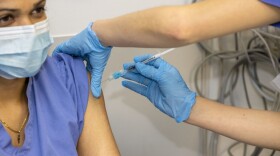Black Americans are more than twice as likely to die from COVID-19 as Caucasians, according to Centers for Disease Control and Prevention data. Medical experts in the Commonwealth say longstanding health disparities contribute to the disproportionate number of deaths, and will require major policy changes to reverse.
According to Dr. Wayne Tuckson, a colorectal surgical specialist with University of Louisville Physicians, chronic diseases such as asthma, found at higher rates in Black communities, are linked closely to socioeconomic status. He said Black families are more likely to live in industrial areas or near highways, breathing in greater concentrations of pollution less than 2.5 microns in size.
"These are the particles than can penetrate deep into our lung tissue, establish inflammatory responses and not only give rise to problems like COPD, but also increase one's susceptibility if somebody does get COVID-19," he said.
State data from 2017 show Black Kentuckians are more likely to die from asthma than any other racial or ethnic group. Tuckson added that even before the pandemic, lack of health insurance meant families didn't receive regular preventive care. He said community groups can help propel policy changes to combat these inequities.
AARP Kentucky's "Disrupt Disparities 2.0" is a campaign to lower the cost of prescription drugs. The group has said Black Americans are more likely to forgo trips to the pharmacy because of cost. The campaign also aims to enact a tax credit for family caregivers and boost access to outdoor-recreation spaces in disadvantaged areas.
Tuckson said poor physical health has ripple effects on people's lives that further worsen health inequities.
"People who are not well can't go to work," he said. "People don't go to work, they don't have revenue. Because they don't have revenue, family wealth is decreased. People who don't have family wealth, poverty."
In 2019, the median Black household earned just 61 cents for every dollar of income for the median Caucasian household, according to the Economic Policy Institute. Tuckson noted that the pandemic's devastating economic effects are likely to widen the wage gap for Black workers for years to come and magnify health inequities.
Disclosure: AARP Kentucky contributes to the Public News Service fund for reporting on Budget Policy & Priorities, Health Issues, Senior Issues, Urban Planning/Transportation.


